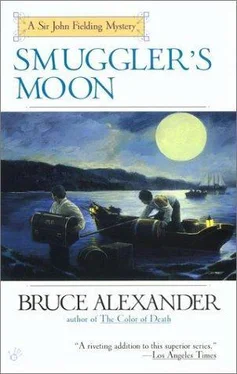Bruce Alexander - Smuggler's Moon
Здесь есть возможность читать онлайн «Bruce Alexander - Smuggler's Moon» весь текст электронной книги совершенно бесплатно (целиком полную версию без сокращений). В некоторых случаях можно слушать аудио, скачать через торрент в формате fb2 и присутствует краткое содержание. Жанр: Исторический детектив, на английском языке. Описание произведения, (предисловие) а так же отзывы посетителей доступны на портале библиотеки ЛибКат.
- Название:Smuggler's Moon
- Автор:
- Жанр:
- Год:неизвестен
- ISBN:нет данных
- Рейтинг книги:4 / 5. Голосов: 1
-
Избранное:Добавить в избранное
- Отзывы:
-
Ваша оценка:
- 80
- 1
- 2
- 3
- 4
- 5
Smuggler's Moon: краткое содержание, описание и аннотация
Предлагаем к чтению аннотацию, описание, краткое содержание или предисловие (зависит от того, что написал сам автор книги «Smuggler's Moon»). Если вы не нашли необходимую информацию о книге — напишите в комментариях, мы постараемся отыскать её.
Smuggler's Moon — читать онлайн бесплатно полную книгу (весь текст) целиком
Ниже представлен текст книги, разбитый по страницам. Система сохранения места последней прочитанной страницы, позволяет с удобством читать онлайн бесплатно книгу «Smuggler's Moon», без необходимости каждый раз заново искать на чём Вы остановились. Поставьте закладку, и сможете в любой момент перейти на страницу, на которой закончили чтение.
Интервал:
Закладка:
“That proves nothing!”
“Not alone-no, of course not. Yet if we look at the soles of the shoes worn by this poor individual, we see no sign of humus. What we find instead is something very interesting: chalk.”
“Chalk?” echoed Sir John.
“Yes sir,” responded Mr. Sarton, ”chalk. It’s quite common in these parts-whole cliffs of the stuff, as I’m sure you’ve heard.”
“So I have.”
“Come all of you who wish, and take a look at these soles-almost completely whitened with chalk dust. And see, too, his clothes are dusted all over with chalk dust. He could not have picked it up here. Sir Simon, do you know of a place in your vast holdings where a man might whiten the soles of his shoes from an abundance of chalk on the ground?”
“No, I know of no such place.” His response came so quickly that it seemed he had anticipated the question. Yet perhaps thinking better of it, he added, ”Though there may be such. After all, I know not every nook and cranny of what you call my ‘vast’ holdings.”
“I meant no offense.”
“None was taken.”
“Good, for I have a few questions regarding him. First of all, who is he-or, lamentably, who was he?”
“I know not his name, but he has been in my employ for the past four or five months. No doubt one of the other men knows who he is.”
“His next-of-kin should be notified, after all.”
“I’ll find out.”
“Good.” Mr. Sarton rubbed his chin, as if in thought. ”Now, this poor fellow’s body is already quite stiff, which means he has been dead a good long time. My guess is that he was killed sometime during the night. What was he doing out, say, well after midnight? Just out on a nocturnal ramble? Or had he some duty to perform?”
“No doubt,” said Sir Simon, ”he was out as a guard. I had left orders that guards be posted.”
“For what purpose? What were they to guard against?”
“Against poachers.”
“Oh? Are they such a problem?”
“I’ve lost a good many deer. I fear I shall have to lay traps.”
“Man traps?”
“Yes, of course.”
“I’ve seen what they can do,” said Mr. Sarton. ”They are truly terrible things.”
“Is not the murder of a man a worse thing?”
“Oh yes. Yes, of course. I did not mean to say …” He allowed the sentence to go unfinished. Yet though that quietened the young magistrate for a moment, it did not end his questions. ”Who found the victim? Was it you, Sir Simon?”
“By no means. I, in fact, was off some distance attending to a business matter near Sandwich. Mr. Fowler found the body just here and sent for me. Then he drove off to Deal to fetch you. I had arrived only a little before you myself.”
“Then it was he who brought us here who found him?”
“That’s as I said.”
“Strange that he did not tell us that.”
“Well, you must take that up with him,” said Sir Simon. ”Now, however, if you have no more need of me, I must return to Sandwich to conclude my business there.”
Without waiting for an answer, he did then gesture that we were to follow and started back through trees and into the underbrush along the way we had come. Having little choice in the matter, we trailed him as before, though this time Mr. Sarton took up the rear, reluctant (it seemed) to leave the body.
When we arrived at the driveway, we found to our general dismay that Will Fowler was nowhere about. His place in the driver’s seat had been taken by one of the two new men, him whose frantic waves had persuaded Fowler to stop. Sir Simon, I noted, was conducting an earnest conversation with the second of them. He concluded with him and came over to us.
“Mr. Sarton, I regret to say that Will Fowler has gone off to attend to his regular duties. I did not tell him to remain because I, like you, supposed he had told you all that he knew before bringing you here.”
“Ah well,” said Mr. Sarton, ”it seems then that we are both deceived.”
“So it seems. I’ll see that he talks to you tomorrow.”
“I should greatly appreciate it if you did.”
“Well then.” With that rather unceremonious goodbye, he took his leave of us and began trudging up the hill. The manor house was no more than a hundred yards ahead.
“Into the coach, gents, and I’ll take you to the house,” called the new driver.
“No,” answered Mr. Sarton, ”I’ve a wish to talk with Sir John. Take the coach up to the house, and turn it round. Then you may drive me back to Deal.”
“As you wish, sir.”
And so saying, he started the team up the driveway, and in a few moments he was out of sight. Only his companion, whom first we viewed emerging from the wood with Sir Simon, remained behind; and he, it seemed, was returning to that spot in the wood where we had been but minutes before. No doubt he had been told to keep a vigil over the body.
Sir John kept his right hand upon my left arm, which I held bent at the elbow. And beyond him, on his left side, walked Mr. Sarton. Thus we went three abreast up the rise along the circling driveway. I was eager to hear what the two men would say one to the other about the scene in the woods, for by that time I had formed impressions and opinions of my own. For a moment or two they seemed to hold back; each seemed to be wishing the other would start. Yet in the end, of course, Sir John initiated the conversation. He never was one to stand upon ceremony.
“I must congratulate you, Mr. Sarton, upon your observations regarding the corpus. It was both sound and clever the way that you proved-conclusively, to my way of thinking-that the victim had been murdered elsewhere and his body simply dumped where it was found.”
“For that I thank you, sir. There is no man alive from whom I would rather hear such praise.” The young magistrate hesitated: ”But … well … I daresay Sir Simon did not take kindly to my suggestion. I don’t know why. I fear I’ve lost a friend.”
“Young man, Sir Simon is not your friend.”
When Mr. Sarton heard that, the look that came upon his face was not one of anger or indignation, but rather one of terrible disappointment. He seemed quite crushed by Sir John’s rather emphatic suggestion.
“It would seem,” said he at last, ”that I have not many left. But why? How did I offend him?”
“He was rather vague on that,” said Sir John, ”but it seems it all has to do with your unwillingness to take his advice and follow his tips on subsequent landings of the smugglers.”
“That was on the advice of another-indeed, the same individual I hope to introduce you to on the morrow.”
”Well, I shall look forward to seeing you then.”
As Sir John realized with that sixth sense of his, we were quite near the entrance to the house. The coach had been turned round, and Mr. Sarton was about to take his leave of us. Therefore, Sir John’s next words to the young magistrate had the sound and sense of a speech of farewell.
“Were I you,” said he, ”I should not worry overmuch whether or not you have the friendship of Sir Simon Grenville. The nature of our work is such that we are not allowed many friends, and those few we have must be those worthy of trust. I do not feel that Sir Simon is altogether worthy of trust, do you?”
Mr. Sarton sighed. ”No, I suppose I do not. If I put great value upon his friendship and support, it is because he is a very powerful man in these parts.”
“Well, it has been my experience that those who have power are most interested in keeping and increasing it. All their plans, all their activities, even their choice of friends-all are directed toward those ends. If Sir Simon once offered you his friendship, it was no doubt because he thought that you could be of use to him. You may take that from an old cynic such as myself, for it has thus far in my experience proven to be so.”
Читать дальшеИнтервал:
Закладка:
Похожие книги на «Smuggler's Moon»
Представляем Вашему вниманию похожие книги на «Smuggler's Moon» списком для выбора. Мы отобрали схожую по названию и смыслу литературу в надежде предоставить читателям больше вариантов отыскать новые, интересные, ещё непрочитанные произведения.
Обсуждение, отзывы о книге «Smuggler's Moon» и просто собственные мнения читателей. Оставьте ваши комментарии, напишите, что Вы думаете о произведении, его смысле или главных героях. Укажите что конкретно понравилось, а что нет, и почему Вы так считаете.












